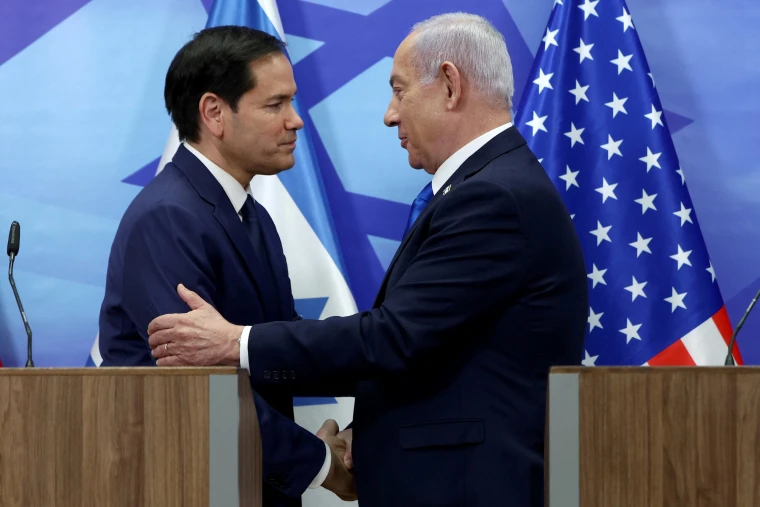U.S. Secretary of State Marco Rubio stated on Sunday that Iran continues to be the “single greatest source of instability” in the Middle East, reaffirming his strong support for Israeli Prime Minister Benjamin Netanyahu.
The two leaders met in Jerusalem as a fragile ceasefire between Israel and Hamas—an Iran-backed militant group—entered its second month, despite being pushed to the brink earlier in the week.
Although the ceasefire remains in place, Rubio emphasized that Hamas must be “eradicated” and commended President Donald Trump’s “bold” plans to take control of Gaza and resettle Palestinians in other countries.
While ongoing talks have focused on hostage exchanges, the future of the ceasefire, and the possibility of lasting peace, Netanyahu remarked that no issue was more pressing than Iran.
Rubio, speaking in Jerusalem, asserted that Iran is “behind every terrorist group, behind every act of violence” and “behind everything that threatens peace and stability.”
Iran has long provided financial support to militant groups such as Hamas, Hezbollah in Lebanon, and the Houthi rebels in Yemen, though it is not involved with other regional groups like the Islamic State.
Through its proxies, Iran has contributed to fueling conflicts across the Middle East while simultaneously advancing its missile program. The country’s leadership remains staunchly opposed to both Israel and the U.S.
Although Iran has not yet sought to develop a nuclear bomb, a 2023 report from the International Atomic Energy Agency revealed that the country had begun enriching uranium to near weapons-grade levels.
“We agreed that the ayatollahs must not acquire nuclear weapons, and we also agreed that Iran’s regional aggression must be curbed,” Netanyahu stated, adding that Israel had “dealt a mighty blow” to Iran over the past year and a half.
In a series of setbacks for Iran, its proxy forces in Lebanon and Gaza have been weakened by their battles with Israel, while the swift collapse of Bashar al-Assad’s Syrian regime—another ally of Tehran—was also a significant defeat.
Netanyahu stated that with U.S. support, “we can and will finish the job,” though he did not provide further details on what that would entail.
Following the meeting, both leaders released a joint statement affirming that Israel and the United States shared a “strategy” for Gaza’s future, “including when the gates of hell will open.”
Hamas and the Iranian government did not immediately respond to NBC News’ request for comment. However, Hamas spokesman Hazem Qassem told NBC News in an interview on Tuesday that the group was committed to the ceasefire agreement, claiming it adheres “fully and not selectively” as Israel does.
In response to Trump’s earlier threat, Qassem said Gaza was already “living in a state of hell.”
These comments seemed to reference Trump’s warning last week that “all hell is going to break out” if Hamas did not release all remaining hostages by Saturday.
After Hamas released three hostages on Saturday, Trump posted on Truth Social that “Israel will now have to decide what they will do about the 12:00 O’CLOCK, TODAY, DEADLINE imposed on the release of ALL HOSTAGES,” and added, “the United States will back the decision they make!”
Although Israel has upheld the ceasefire despite Trump’s deadline, the meeting in Jerusalem did not offer clear messaging regarding the future of the ceasefire or further conflict in Gaza.
Rubio emphasized that Hamas “cannot continue as a military or government force,” stating that the hostages “need to come home,” but did not mention the second phase of the ongoing ceasefire, which was set to begin earlier this month.

